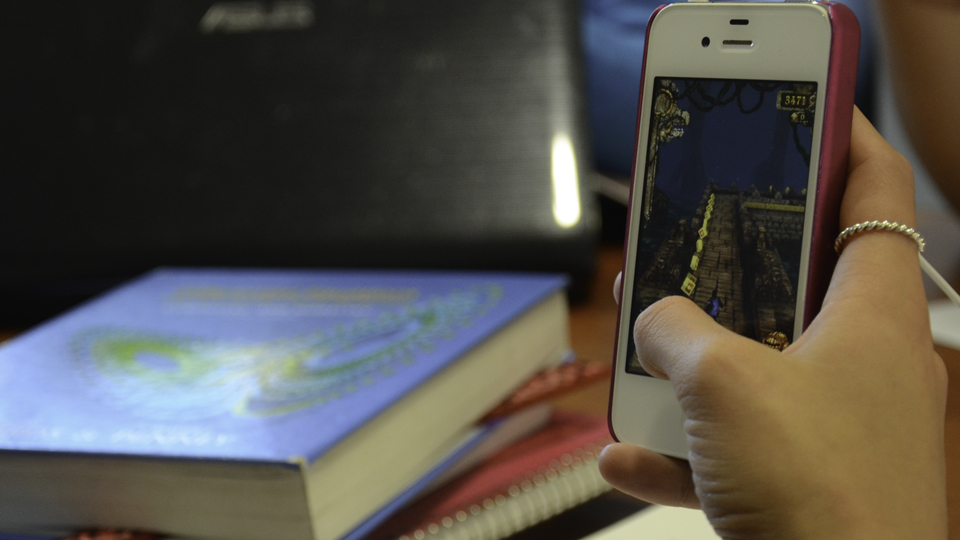“One down, two more to go!” cheers Elizabeth, a first-year UTM student. She slams her laptop screen shut. Two seconds later, she realizes she needs to have a shot of caffeine to keep her up. At 10 p.m., she trots to her kitchen, gulps down an entire can of Red Bull, and heads back to her laptop. The battle for survival continues.
Many UTM students believe their workload exceeds normal limits. They say it leaves no breathing room for a social life, or even for sleep. Whether that belief is justified or not, postsecondary education is always tough. It requires you to manage your time efficiently. But whether it’s because we procrastinate, or because we legitimately don’t have time, many of us become anxious the night before a major assignment is due.
There are several explanations for procrastination. For some of us, the instant gratification that comes from doing something else—like surfing the Web, watching TV, or hanging out with friends—makes that something else feel more worthwhile than a reward that only comes later, such as doing well on a test or assignment. For others, it’s the fear of failure.
Whatever the reason for it, procrastinating hurts in the long run. While your grades could be improved by working harder or repeating a course, the damage done to your body can’t be so easily restored.
One of the most common results of procrastination is the infamous all-nighter. (Of course, some students who pull all-nighters aren’t procrastinating, but simply prefer night activities or accept night shifts at work.) In any case, making a habit of staying up all night disrupts the body’s biological clock. According to surveys conducted by the US Centers for Disease Control and Prevention, 29% of US adults get less than seven hours of sleep per night. Not only that, the surveys also revealed that 50 to 70 million Americans suffer from a chronic sleep disorder.
In 2011, a team of scientists in Japan studied a group of workers who been diagnosed with type 2 diabetes (also known as “adult-onset diabetes”). These workers had also cut down on their sleep to work night shifts. The study found that workers who slept under five hours a night were six times more likely to develop diabetes than those who slept for more than seven hours a night.
Students’ thinking has changed. Instead of considering sleep a major part of our daily lives, we disregard its importance, thinking of it as something that can be sacrificed to get done what needs to be done. Some even consider it a waste of time; they think the less they sleep, the more they’ll get done.
But we forget that skipping a night’s sleep has an effect on the rest of the week.
Our bodies are programmed to begin work when the sun rises and to slow down as the sun sets. At night, our metabolism slows and glucose molecules build up in our bloodstreams. In the fight to stay awake, we chug caffeine. The sugar that builds up in that time not only works against your hour at the gym, it’s also what led to the development of type 2 diabetes in the study. Among the Japanese workers, 91% of those who developed diabetes had no family history of it.
The same study also linked two other sleep-relatd behaviours to diabetes: poor quality of sleep and sleeping more than 10 hours.
A 1999 study found that 40% of people who slept only five to six hours a night saw a decrease in their glucose tolerance. Impaired glucose tolerance is a bodily state that usually precedes diabetes. Another study showed that during sleep, the body’s hormones fluctuate and trigger changes in its neurophysiologic chemical signals, which are messages that disrupt the body’s nervous system. For example, the pituitary gland releases hormones that help produce glucose molecules, an excess of which can lead to high levels of growth hormones, inflammation in the blood vessels, and altered appetite hormones. That’s why all-nighters go hand in hand with severe food cravings.
Even exercising becomes a little useless. Think about it: many students are willing to stay up several extra hours to work, but not as many would give up an hour at the gym. But even when they get that exercise, if they don’t get the proper sleep, then that buildup of glucose comes into play again. Burning off calories at the gym doesn’t help as much if you gain double that amount by staying awake that night. On top of that, your level of activity the next day tends to drop significantly.
Sometimes we fail to acknowledge that procrastination is at the root of this situation, and so we blame our heavy workload or the harsh marking of our instructors as reasons for pulling all-nighters.
If you’re an upper-year student and you’ve been sacrificing sleep for years, you might think that a lack of sleep never put you at a disadvantage. Or that you’ve somehow trained yourself to live this way. But the risk factors that come with lack of sleep—primarily the buildup of glucose that leads to all these problems—may only manifest itself years later. The symptoms of these malfunctions may not even appear until you’re 35.
So instead of battling against sleep, we should be battling against procrastination. At the end of the day, school and work are important, of course—but not as much as your health.

